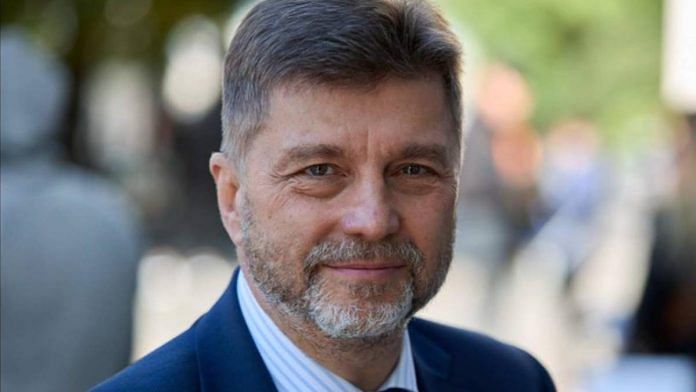New Delhi: India “unwittingly” violated the principles of its neutrality in the ongoing Russia-Ukraine conflict by not inviting Ukrainian President Volodymyr Zelenskyy to address the G20 summit in New Delhi, Oleksandr Polishchuk, the ambassador of Ukraine to India, told ThePrint in an interaction earlier this month.
“By depriving the President of Ukraine of the opportunity to participate in the Delhi G20 summit, India unwittingly violated the principles of its neutrality. Because it is a matter of compliance, justice, equal opportunities and political pluralism as the basic principles of democracy,” Polishchuk said in written comments to ThePrint.
“We believe that no decision regarding Ukraine should be made without Ukraine. Delhi should understand that this is one of the fundamental principles for Ukraine,” the ambassador added.
Polishchuk also termed the difference in positions between the Bali G20 declaration and the Delhi declaration “significant and fundamental in Kyiv’s perception”.
India had hosted the leaders of the Group of 20 nations in New Delhi on 9-10 September. The summit led to the New Delhi Leaders’ Declaration (NDLD), where all leaders present, including the Russian delegation, agreed to specific language in the final declaration that avoided direct criticism of Russia in its war in Ukraine.
The language in the NDLD was different from the language used in the declaration made at the end of the G20 summit held in Bali in November 2022, which “deplores” in the “strongest terms” the Russian “aggression” against Ukraine.
The NDLD, however, termed the conflict the “war in Ukraine” rather than “against”, and called on all states to act in line with the principles of the United Nations Charter in its “entirety”.
External Affairs Minister S. Jaishankar in September defended the formulation of the language on the conflict in Ukraine, saying that: “Bali was Bali, New Delhi is Delhi. Many things have happened since the Bali declaration.”
Zelenskyy had addressed the G20 leaders in Bali, outlining the 10-point Ukrainian formulation for peace, which included nuclear and radiation safety, food security, energy security, release of prisoners, restoration of Ukrainian territorial integrity and the cessation of hostilities, to name a few points of the proposal.
Also Read: ‘What cynicism’ — European Council president lashes out at Russia in G20 address
‘Softness is appeasement’
“The difference in the positions that were declared by the leaders of the G20 states in Bali in 2022 and in Delhi in 2023 looks quite significant and fundamental in Kyiv’s perception,” Polishchuk said.
“A strong condemnation of the war — ‘the aggression by the Russian Federation against Ukraine and demand (of) its complete and unconditional withdrawal from the territory of Ukraine’ was replaced with a softer formulation,” he added.
He emphasised that Russia “must be named directly and publicly and condemned for its aggressive actions”.
Polishchuk asserted that “softness is appeasement and it only inflames the aggressor’s appetites. We have seen this more than once in world history”.
“We also hoped that, as last year, the President of Ukraine would receive an invitation to participate in the Delhi G20 Summit. Unfortunately, this didn’t happen. Despite all the efforts of Ukrainian diplomacy and our allies and partners. Did it help to avoid discussions about Ukraine and the impact of the war started by Russia on the world agenda? Definitely not,” Polishchuk said.
G20 declaration ‘nothing to be proud of’
In September, Oleh Nikolenko, a spokesperson for the Ukrainian foreign ministry, had said in a post on social media that the NDLD was “nothing to be proud of” in terms of the Russia-Ukraine conflict.
G20 adopted a final declaration. We are grateful to the partners who tried to include strong wording in the text. However, in terms of Russia's aggression against Ukraine, G20 has nothing to be proud of. This is how the main elements of the text could look to be closer to reality pic.twitter.com/qZqYluVKKS
— Oleh Nikolenko (@OlegNikolenko_) September 9, 2023
Polishchuk said that the fact that Zelenskyy was not invited to address the New Delhi G20 summit was part of Russia’s “neo-colonial strategy” to deprive Ukraine of international agency.
“This is a part of Putin’s neo-colonial strategy to marginalise and deprive Ukraine of international subjectivity, and then negotiate its fate between ‘power centres’ through backroom channels,” he said.
Jaishankar, addressing a press briefing on the outcomes of the G20 summit in September, had said that the grouping was not the forum to solve geopolitical and security issues. However, the Russia-Ukraine conflict has had serious ramifications for the world economy.
For example, the Russian withdrawal from the Black Sea grain deal, which allowed the export of grain and oil from Ukraine, led to a surge in global food prices earlier this year.
(Edited by Nida Fatima Siddiqui)
Also Read: How do you count the takeaways from India’s G20? It’s as simple as ABCD



